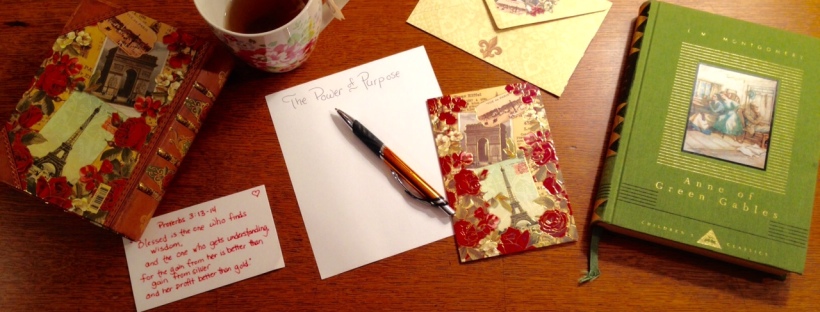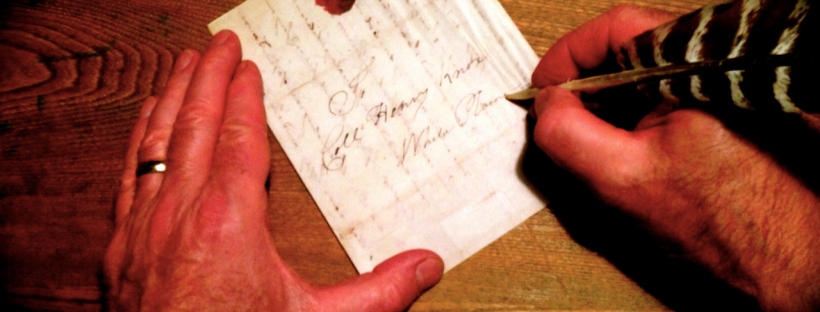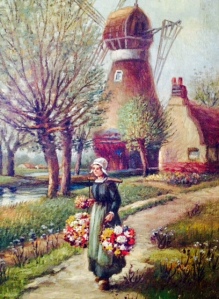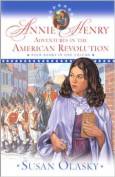I’m discovering that grief goes through seasons. That makes sense since it’s intertwined into life, right?
And November is when the frills fade and grief settles down to overcast, bare realities. Note I didn’t say bad realities. The realities are just bare, stripped of the things that hide them or give them a rosy glow at other times of the year.
Today it has been nine months since Grandma passed away. So much has happened that I’d like to tell her about. If I could write her a letter, it would go something like this…
Dear Grandma,
I’ve been missing you more lately. I didn’t know that it would work like that – that I would miss you more later than at first. Maybe it’s because I’ve realized you won’t be here for Thanksgiving pie and I won’t be trying to figure out what to get you for Christmas. A lot of what I miss is getting to chat with you. Whether on the way to church or over our quiches and scones at that little coffee shop or here at home, we did a fair amount of chatting, didn’t we?
I’d like to be able to tell you about the changes in my life. Best of all is the new precious grandbaby. Tiny toes, always-moving hands, sleepy chirps, and kiss-me-please chubby cheeks! It really is true that babies grow so fast. Beyond that, you would love my new group of students. They’re exceptional, and I’m not just biased. I’m learning more about teaching and Spanish. Then there’s my writers’ group. I could probably make a book of stories about the different authors. You’d like reading some of their books. It would be a great way to find some you actually hadn’t read yet! Of course, I’d like to tell you about my own projects like how I’ve been tweaking that one last story I got to read to you and am also working on a new one. The new story involves pies…I guess that won’t surprise you. Then there are little things like how we repainted the bathroom. You might wonder about the combination of “watery” and “lei flower” paint, but, once you hear how it makes me think of the land of alohas and well-loved tales that take place there, you’ll laugh and decide it was a good – or at least ok – idea.
Speaking of laughing, I miss your clever ways of saying things. When you were alone, did you spend time just thinking up what to say to bring smiles to our faces? Some of your growing-up stories were pretty funny, too. You made life as one of seven kids in a pastor’s family sound pretty grand even with the hard times you faced. I’d like to hear those stories again and get to ask you more questions. There are things I never thought to ask you before that now I wish I knew.
It would be great to get your input on some of the decisions I’m working through. Like should we move to Norway and become reindeer ranchers or should we move to Ecuador and live in a house like Swiss Family Robinson? Ok, just kidding! The point is, our family tended to value your judgment on the big things, and I feel a little lost without it sometimes. I also miss asking you to pray for me, hearing you say you will and knowing I could count on it. Not that I don’t have other people who pray for me – it’s just not the same somehow…
That reminds me of something that came up at one of my writers’ meetings. In talking about our audiences, the thought popped up that generally young people today don’t have older mentors in their lives. I realized that that wasn’t true of me. How blessed I have been to have older people like you in my life. People with the time to listen, to laugh, to think and to pray. That’s definitely something to be thankful for, isn’t it?…
I guess that’s what happens when grief – and life – gets “Novembered”: we realize the things that really matter. With the extras blown away, we see, yes, what we’ve lost but also what we’ve been given and for what we can be truly thankful…even through the tears.





 etails and vibrant expressions to Mrs. Coney, a friend back in Denver. Thanks to her friend, Elinore’s letters were published in the Atlantic Monthly and later in a book illustrated by N.C. Wyeth. Her story lives on through print editions and an audiobook called
etails and vibrant expressions to Mrs. Coney, a friend back in Denver. Thanks to her friend, Elinore’s letters were published in the Atlantic Monthly and later in a book illustrated by N.C. Wyeth. Her story lives on through print editions and an audiobook called 


